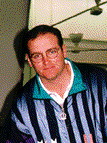August 2002 Article
Tennis Server
|

 |
In my June article I discussed the importance of practice among junior players and setting appropriate goals. The point of my article was not to put down junior players but to get some feedback from players and parents about the goals that they have and the amount of practice they put in to reach these goals. I have to admit that I was a little nervous about the type of feedback I would receive. Obviously telling juniors they need to practice more is a touchy subject and I opened myself up to plenty of criticism. I received more emails on this subject than any I've ever written for Tenniserver.com. Believe it or not, 99% of the feedback I received was positive and in agreement with my article. I received emails from all over the world, from parents, players, and coaches. After taking some notes from several of the emails I received I was able to put together some ideas with these results:
Now I'm sure I'll receive more feedback from this article as well but these are simply the results I have compiled from information I received from all over the world. Most players know that if someone has superior athletic skill they may need less practice and a less skilled player will need more. And there are times when a parent can't understand why their son/daughter isn't winning. There could be several answers but you always have to look at the natural athletic ability of a player and mental toughness of a player. As hard as it is to admit, "some players have it and some don't." Almost half of the e-mails I received were from parents wanting to discuss the possibility of a professional career for their child. As McEnroe would say "you can't be serious!" Unless a player is already competing at a high national or collegiate level I would suggest getting that thought out of your mind. I had a dozen or more inquiries about the pro tour from players and parents of players that weren't even competing in sanctioned tournaments yet! To me this is a scary thought. I learned quite a bit with this experiment and it confirmed to me the things I thought were true as far as junior players and their goals were concerned. I have one bit of advice before leaving the subject. Get as much knowledge as possible from your local/club teaching professional. When you think you need more help than what he/she can give you, then your ranking should be very high. Your local instructor knows your game, knows your goals, and knows how much you are willing to practice to achieve those goals. In most situations I think good teaching professionals will help you reach realistic goals. A teaching professional has nothing to gain by a junior player failing so he/she will do everything he/she can to help. Give them a chance and many times you'll find they have all the tools to help you reach your goals.
This column is copyrighted by Mike Whittington, all rights
reserved.
At the time at which he wrote this column, Mike Whittington was a USPTA pro in Fort Smith, Arkansas, where he served as director of
tennis at the Hardscrabble Country Club.
|



October 2022 Tennis Anyone: Patterns in Doubles by John Mills. September 2022 Tennis Anyone: Short Court by John Mills. |
 You will join 13,000 other subscribers in receiving news of updates to the Tennis Server along with monthly tennis tips from tennis pro Tom Veneziano.
You will join 13,000 other subscribers in receiving news of updates to the Tennis Server along with monthly tennis tips from tennis pro Tom Veneziano. 